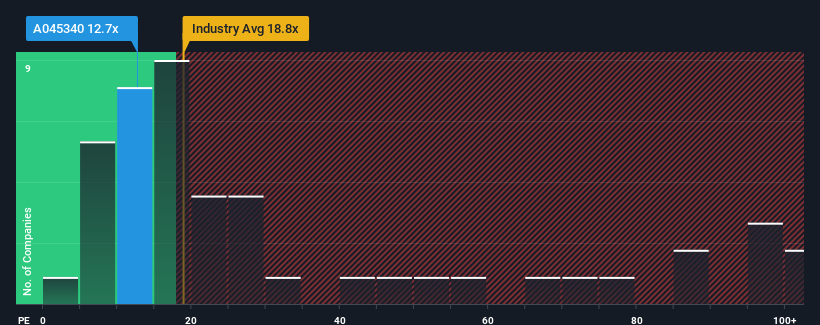- South Korea
- /
- Software
- /
- KOSDAQ:A045340
Total Soft Bank Ltd.'s (KOSDAQ:045340) 27% Share Price Surge Not Quite Adding Up
Despite an already strong run, Total Soft Bank Ltd. (KOSDAQ:045340) shares have been powering on, with a gain of 27% in the last thirty days. Looking back a bit further, it's encouraging to see the stock is up 48% in the last year.
In spite of the firm bounce in price, it's still not a stretch to say that Total Soft Bank's price-to-earnings (or "P/E") ratio of 12.7x right now seems quite "middle-of-the-road" compared to the market in Korea, where the median P/E ratio is around 14x. While this might not raise any eyebrows, if the P/E ratio is not justified investors could be missing out on a potential opportunity or ignoring looming disappointment.
Recent times have been quite advantageous for Total Soft Bank as its earnings have been rising very briskly. It might be that many expect the strong earnings performance to wane, which has kept the P/E from rising. If that doesn't eventuate, then existing shareholders have reason to be feeling optimistic about the future direction of the share price.
View our latest analysis for Total Soft Bank

How Is Total Soft Bank's Growth Trending?
There's an inherent assumption that a company should be matching the market for P/E ratios like Total Soft Bank's to be considered reasonable.
Retrospectively, the last year delivered an exceptional 43% gain to the company's bottom line. Pleasingly, EPS has also lifted 83% in aggregate from three years ago, thanks to the last 12 months of growth. So we can start by confirming that the company has done a great job of growing earnings over that time.
Weighing that recent medium-term earnings trajectory against the broader market's one-year forecast for expansion of 35% shows it's noticeably less attractive on an annualised basis.
In light of this, it's curious that Total Soft Bank's P/E sits in line with the majority of other companies. Apparently many investors in the company are less bearish than recent times would indicate and aren't willing to let go of their stock right now. They may be setting themselves up for future disappointment if the P/E falls to levels more in line with recent growth rates.
The Key Takeaway
Its shares have lifted substantially and now Total Soft Bank's P/E is also back up to the market median. We'd say the price-to-earnings ratio's power isn't primarily as a valuation instrument but rather to gauge current investor sentiment and future expectations.
We've established that Total Soft Bank currently trades on a higher than expected P/E since its recent three-year growth is lower than the wider market forecast. When we see weak earnings with slower than market growth, we suspect the share price is at risk of declining, sending the moderate P/E lower. If recent medium-term earnings trends continue, it will place shareholders' investments at risk and potential investors in danger of paying an unnecessary premium.
We don't want to rain on the parade too much, but we did also find 2 warning signs for Total Soft Bank (1 doesn't sit too well with us!) that you need to be mindful of.
You might be able to find a better investment than Total Soft Bank. If you want a selection of possible candidates, check out this free list of interesting companies that trade on a low P/E (but have proven they can grow earnings).
Valuation is complex, but we're here to simplify it.
Discover if Total Soft Bank might be undervalued or overvalued with our detailed analysis, featuring fair value estimates, potential risks, dividends, insider trades, and its financial condition.
Access Free AnalysisHave feedback on this article? Concerned about the content? Get in touch with us directly. Alternatively, email editorial-team (at) simplywallst.com.
This article by Simply Wall St is general in nature. We provide commentary based on historical data and analyst forecasts only using an unbiased methodology and our articles are not intended to be financial advice. It does not constitute a recommendation to buy or sell any stock, and does not take account of your objectives, or your financial situation. We aim to bring you long-term focused analysis driven by fundamental data. Note that our analysis may not factor in the latest price-sensitive company announcements or qualitative material. Simply Wall St has no position in any stocks mentioned.
About KOSDAQ:A045340
Total Soft Bank
Operates as maritime logistics solutions company in South Korea.
Outstanding track record with flawless balance sheet.
Market Insights
Community Narratives


Recently Updated Narratives


MINISO's fair value is projected at 26.69 with an anticipated PE ratio shift of 20x


The Quiet Giant That Became AI’s Power Grid


Nova Ljubljanska Banka d.d will expect a 11.2% revenue boost driving future growth
Popular Narratives


The company that turned a verb into a global necessity and basically runs the modern internet, digital ads, smartphones, maps, and AI.


MicroVision will explode future revenue by 380.37% with a vision towards success



